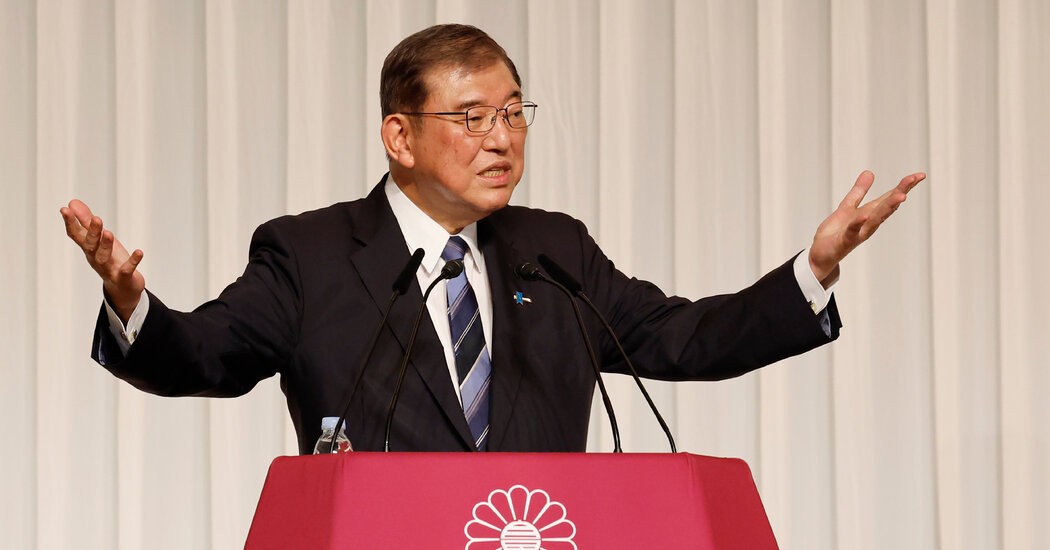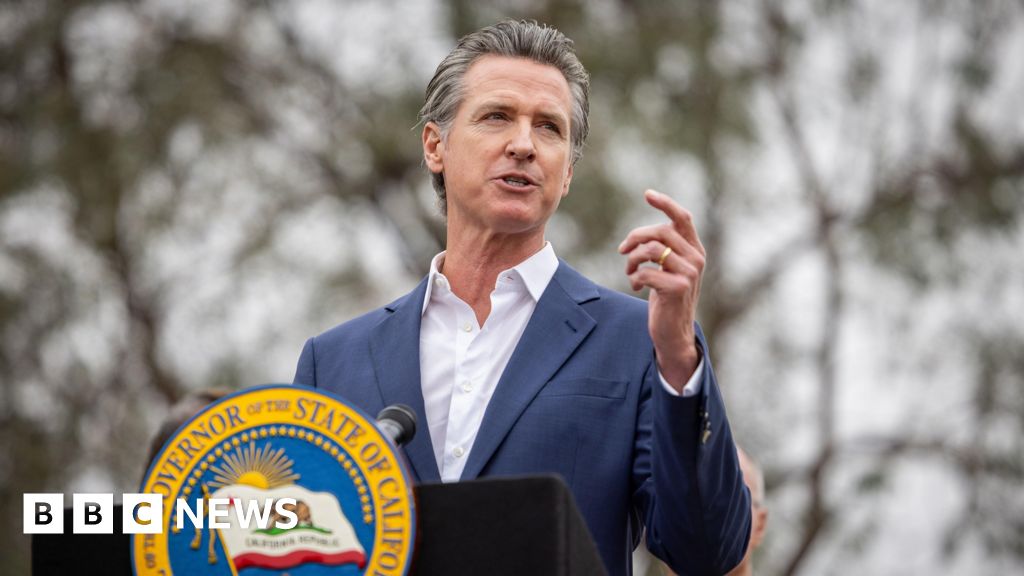This is an audio transcript of the FT News Briefing podcast episode: ‘Swamp Notes — Harris and Trump pitch their economic visions’
Sonja Hutson
Every American political strategist knows, if there’s one thing voters care about above all else, it’s the economy. And this week, with less than 40 days until election day, the candidates criss-crossed the country to talk about it.
Kamala Harris voice clip
My vision for the economy, I call it an opportunity economy.
Donald Trump voice clip
On November 5th, we will save our economy.
[MUSIC PLAYING]
Sonja Hutson
This is Swamp Notes, the weekly podcast from the FT News Briefing, where we talk about all of the things happening in the 2024 US presidential election. I’m Sonja Hutson, and this week we’re asking, what could Harris and Trump’s economic plans mean for the country? Here with me to discuss is James Politi. He’s the FT’s Washington bureau chief. Hi, James.
James Politi
Hi, Sonja.
Sonja Hutson
And we’ve also got Peter Spiegel, the FT’s US managing editor. Hi, Peter.
Peter Spiegel
Thanks for having me, Sonja.
Sonja Hutson
Glad to have you. So I want to start with Kamala Harris and her economic plans. She gave a big speech and released an economic policy document this week. James, what did we learn from the document and from the speech?
James Politi
Well, she’s pitched it very much as a kind of pragmatic, moderate approach to economic policy. There are no big changes, actually, compared to the Biden administration. But she does add a few more elements. She’s got new tax credits for first-time homebuyers. She’s promising to boost housing supply, promising an expansion of the child tax credit. There are a lot of incentives for starting small businesses. So she’s trying to target areas that interest her and that she thinks will be politically helpful to her in the final stretch of the campaign and are sort of popular parts of the Biden agenda.
Sonja Hutson
Yeah, no, I’m glad that you brought up that comparison with the Biden agenda, because she has kind of a tricky balancing act here, right? I mean, she is the second-highest-ranking member of a historically unpopular presidential administration, and it’s been particularly unpopular because of economic issues. And think about inflation here. So she can’t exactly discard everything that the administration has done. But she also wants to signal that she’s moving on from Biden. So, Peter, what do you think the political thinking is behind which of Biden’s policies she’s keeping and which she’s distancing herself from?
Peter Spiegel
Inflation, inflation, inflation — that is the biggest problem for her in particular, and what really, I think, was dragging Biden when he was still in the campaign. We have this monthly poll we do with the University of Michigan’s Ross School of Business. And we ask repeatedly, what is the biggest concern that you have going into election day? And by far it is high prices. It is inflation. And that has a lingering effect because, although inflation is coming down, it’s back in sort of the normal range, it’s that prices aren’t going down. They’re just going up at a less fast rate. So she needs to sort of, I would say, neutralise that. You know, James and I, before Biden pulled out, had a meeting with one of Biden’s leading political advisers. And we were pushing pretty hard on this issue. How can you win if you can’t advocate for your economic policies? And they’re . . . to summarise the response, it was, we’re not gonna win on this. We have to neutralise it. Right? We need to change the conversation.
Sonja Hutson
Is it kind of like she’s just rebranding something that is essentially the same policy? Like, you know, she keeps using the phrase opportunity economy, but do we have a sense of what that actually means?
James Politi
Well, when she talks about the opportunity economy, that’s not necessarily the way Biden spoke about it. It’s a slightly more business-friendly, more moderate approach to economic policy, I think. You know, one of the things she’s wanted people to know is that she’s in favour of, you know, a higher tax rate on capital gains, but lower than what Biden had proposed. So that gives you a sense that she might be a little more sort of business-friendly in her approach to economics.
Peter Spiegel
I think that’s a really important point. I just emphasise this because I think, again, if we’re talking about how to differentiate the two candidates, you know, by which I mean Biden and Harris, I think this is a key, key thing. I think it’s fair to say that the Biden administration is one of the most anti-business administrations we have seen in our modern politics. And I don’t necessarily say that being good or bad. I mean, look, he’s Scranton Joe. He’s very pro-labour. He goes on picket lines. That’s not something you would see Barack Obama or Bill Clinton do. They were not as overtly pro-labour as Joe Biden was.
You look at Lina Khan of the Federal Trade Commission breaking up companies. You look at Gary Gensler at the SEC. These are all very, you know, aggressive, regulatory and pro-labour kind of policies. Harris has less of that kind of record in the Senate. And certainly, you know, in her time in California, she’s from northern California, obviously the centre of the tech industry. And reputationally what we hear from the business community is she was, she may have done policies that they didn’t like necessarily, but they were open to conversations. So I think that is a, that’s a significant difference rhetorically but also stylistically, and I suspect going forward from a policy perspective.
Sonja Hutson
All right. Well, let’s talk about Trumponomics now. James, you just wrote an FT Big Read about this. I’m wondering what you think that Trump thinks the big problem with the US economy is, and how does he hope to solve it?
James Politi
He hopes to solve it with a lot of tax cuts in a lot of areas and a lot of tariffs against imports from a lot of different countries and very high tariffs as well. So he’s promised to lower the corporate tax rate. He’s promised to extend his own tax cuts for individuals. And then on the campaign trail, he’s also said, you know, no taxes on tips, no taxes on overtime. Really, I mean, hundreds of billions of dollars’ worth of revenue that he’s trying to kind of cut out. And then on tariffs, too. I mean, he’s got up to 20 per cent tariffs on all imports, from everywhere, and even higher tariffs on products coming in from China. He’s throwing around like tariff threats really left and right.
Peter Spiegel
For a non-traditional candidate, boy, is this kind of the traditional way politicians use to attract voters. You want a tax cut? You get a tax cut. You want a tax cut? It’s like Oprah. You have a tax cut. You get a tax cut. You know, I mean it’s getting a little bit silly now. Every week someone else gets a tax cut ‘cause he’s trying to win them over in swing states.
What is genuinely different about Trumponomics is the reliance on tariffs as an economic tool. And then by extension, it’s not really an economic policy but will have impact economically, which is the really hardcore anti-immigration bit. But I think the tariff thing is worth focusing on because this was, you know, on both Democrats and Republicans for a generation or three, was seen as anathema. And it has become now accepted policy, frankly, in a bipartisan manner, that makes me a little bit concerned that tariffs are legitimate tool of economic policy. There’s this assumption that there won’t be retaliatory tariffs. And that magically this will spur investment in the United States because you can’t import things domestically. Suddenly a revitalisation of the other manufacturing base, blah, blah, blah, blah, blah. But we have copious amounts of historical data that shows that doesn’t happen. And actually what happens is it’s a tax on US importers. They pass on those costs to consumers. Inflation goes up and global economic activity slows.
Sonja Hutson
So it sounds like these tariffs themselves could have a pretty big impact. but I’m curious what you two think the impact will be of not only the tariffs but those combined with renewed tax cuts under a second Trump administration and also his plan to deport millions of undocumented immigrants. I mean, what kind of impact could all of that together have?
Peter Spiegel
I mean, the obvious thing. I mean, if you just do economics 101, what immigration has done and done over the course of American history is provided a new labour force for American industry. And frankly, one of the things the Fed has looked at very, very closely as it’s trying to decide whether to bring down interest rates is labour costs. And if suddenly you suck out through deporting 10mn people or whatever the latest Trump number is, that’s 10mn people who are not in the labour force any more. And suddenly the demand for labour goes through the roof because there’s no supply left. And so there is a direct impact on inflation and on the labour force and on prices through a highly aggressive immigration policy.
Sonja Hutson
Well, just quickly on the tax cuts piece of that. Could those present any, I don’t know, fiscal problems?
Peter Spiegel
James cited, you know, I think, James, you said hundreds of billions of dollars of basically deficit financing. Because if you suddenly cut all these taxes on the Trump plans, you end up with lack of revenue. And, you know, no one cares about government debt until the markets care about government debt. And that’s what happened to Greece. That’s what happened to Italy. The markets at some point are gonna say, jeez, the US debt load is so high that we’re no longer gonna finance you at 2, 3, 4 per cent. We’ll finance you at 7, 8, 9 per cent. And that is bad for the US government. But that’s also bad for mortgage rates and credit card rates and all the stuff you and I pay on a daily basis, because everything is tied to that, the Treasury yields. So I am shocked that neither the Republicans nor the Democrats seem to care about the budget deficit any more.
James Politi
But also, I mean, Americans have gotten a flavour now of, you know, higher interest rates and higher inflation. And they haven’t liked it, so they’ve gotten a taste, you know, the taste for it that, you know, they hadn’t had for 40 years. And so maybe it will kind of raise some alarm bells at some point.
Sonja Hutson
All right. So we’ve been getting really into the nitty gritty about what Trump and Harris want to do with the economy if they’re elected. But I’m wondering, do voters actually respond to policy debates like this and like the one that we’re seeing play out on the campaign trail?
James Politi
I mean, I think the question now is, is it too late? Because I think a lot of economic perceptions are kind of sealed earlier in the election year. And over time, I think a lot of damage has been done by inflation and high prices. And so that’s, a lot of that is locked in. Now, the question is, can Harris kind of recover in the final stretch and will perceptions change? The environment is pretty benign. It’s probably the best that she could have hoped for. With, you know, easing inflation almost down to 2 per cent. It’s about 2.5 per cent at the moment, and job growth has slowed a bit. But you’re not seeing mass lay-offs. We’re not in a recessionary environment at this point. It’s sort of the best circumstances that I think Harris could have hoped for, but it may still have come too late to really save the Democrats.
Peter Spiegel
The other point I’ll make on that, though, is the very changing of Biden to Harris, where Biden was identified as the president who presided over all this inflationary pressure. Even though she was vice-president, what we have seen a lot of public opinion polling, including, I would say once again, the FT-Michigan Ross poll, is that the very change in the candidate has changed the narrative. We’ve been asking every month who can handle the economy better, Trump or Biden, Biden or Trump? And throughout, since we start doing it a year ago, Trump was 7, 8 percentage points ahead of Biden. Suddenly, Harris is now ahead of Trump. Harris has jumped 7 or 8 percentage points higher than Biden. So just as James said, a lot was baked on, you baked in early and really, I think, unchangeable in terms of perceptions of economic competence. But the fact that you changed the candidate seems to have had an impact on perceptions, and that people are willing to give Harris the benefit of the doubt because she’s a relatively unknown figure, whereas Biden is known and they associate him with inflation.
Sonja Hutson
All right. We’re gonna take a quick break. And when we come back, we’ll do Exit Poll.
[UNHEDGED TRAILER PLAYING]
And we are back with Exit Poll, where we talk about something that did not happen on the campaign trail and apply rigorous political analysis to it. So last week, the FT marked 30 years since starting its Lunch with the FT series. And it’s basically where an FT journalist takes someone important out to lunch. It could be a politician, an inventor, a business exec and we have done 1,500 of them. So for both of you this week on Exit Poll, I want to ask if you could have lunch with any American political figure, dead or alive, who would it be and where would you take them?
James Politi
I’d like to do Barack Obama. Because I want to find out what exactly happened in July. How much pressure did he actually put on Joe Biden to leave the race? And, does he have any regrets about his time in office? And what would he do if he had a third term?
Sonja Hutson
Where would you take him to elicit these juicy answers?
James Politi
Well, I was just in Savannah, Georgia. There’s an old Greyhound station that’s been converted to a restaurant, and that seems like a good, good place to do it.
Sonja Hutson
Love it. All right, Peter, you’re up.
Peter Spiegel
I’ve gone, I’ve gone with John McCain.
James Politi
2008 all over again.
Sonja Hutson
I know. (Laughter)
Peter Spiegel
Once again, as James knows, I am from Arizona. I talk endlessly about Arizona.
Sonja Hutson
Really, Peter? I had no idea.
Peter Spiegel
Yeah, yeah, I know, but the reason I would love and obviously, firstly Senator McCain died a few years ago, but it is, he is, in my mind, the last of sort of the Reagan-era Republicans. And I just be curious about what he makes of his Republican party. And sticking to the Arizona theme, when I grew up, it’s very hard to find good Mexican food outside of the south-west United States, I would argue. So the family restaurant we would go to when I was a kid is called Garcia’s. So I would take John McCain to Garcia’s in east Phoenix.
Sonja Hutson
All right, order some tacos for me.
I want to thank our guest, James Politi, the FT’s Washington bureau chief. Thanks, James.
James Politi
Thanks for having me, Sonja.
Sonja Hutson
And Peter Spiegel, he’s our US managing editor. Thanks, Peter.
Peter Spiegel
Always a pleasure.
[MUSIC PLAYING]
Sonja Hutson
This was Swamp Notes, the US politics show from the FT News Briefing. If you want to sign up for the Swamp Notes newsletter, we’ve got a link to that in the show notes.
Our show is mixed and produced by Ethan Plotkin. It’s also produced by Lauren Fedor and Marc Filippino. Special thanks as always to Pierre Nicholson. I’m your host, Sonja Hutson. Our executive producer is Topher Forhecz, and Cheryl Brumley is the FT’s global head of audio. Original music by Hannis Brown. Check back next week for more US political analysis from the Financial Times.










































































































































You must be logged in to post a comment Login